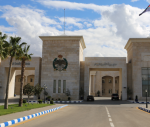You are here
Biden seems to have run out of steam
Jul 20,2022 - Last updated at Jul 20,2022
During the 2020 presidential election campaign Joe Biden promised to reverse Donald Trump's destructive policies and return the US to internal prosperity and external influence. On his first day in office, Biden signed 17 executive orders which were meant to reverse Trump's negative legacy. Biden halted construction of Trump's wall along the US-Mexican border, reversed Trump's travel ban on citizens from Muslim countries and withdrawal from the World Health Organisation, and began the process of re-joining the Paris climate change accord. During the next 99 days, Biden signed more than 60 executive orders, 24 being reversals of Trump policies.
Unfortunately, Biden did not include tackling Trump's inheritance in this region during those energetic 100 days. Biden seems to have run out of steam. While he could not reverse Trump's recognition of Jerusalem, including occupied Palestinian East Jerusalem, as Israel's capital, Biden did not promptly resume the US contribution to UNRWA which cares for 5.7 million Palestinian refugees in this region, restore funding to Palestinian hospitals, and reopen the US consulate on Nablus Road in East Jerusalem and the Palestinian mission in Washington. Instead, Biden pledged support for the defunct "two-state solution" involving the emergence of a Palestinian state alongside Israel while continuing to fund Israel at the rate of $3.8 billion a year. This helps finance Israel's illegal occupation of Palestinian and Syrian territory and imposition of an apartheid system of governance on Palestinians living in East Jerusalem and the West Bank and siege and blockade of Gaza and its 2.1 million people.
Biden did not sign an executive order for the return of the US to the 2015 six-power agreement limiting Iran's nuclear programme in exchange for lifting sanctions. While Biden castigated Trump for abandoning the deal in 2018, he laid down conditions for US re-entry which Iran would never concede and piled fresh sanctions on the 1,500 imposed on Iran by Trump and his minions. As a result of Biden's adoption of Trump's policy of "maximum pressure" to make Iran capitulate to US demands, Tehran has stood firm and, so far, the agreement remains in dangerous limbo. Meanwhile, Iran flouts the limits on uranium enrichment set by the deal and reduces UN monitoring of its nuclear facilities. As Biden has no Plan B if the deal collapses altogether, talks stumble on while a draft of the deal awaits finalisation.
The reckoning came last weekend when Biden paid his first visit as president to Israel, Palestine and Saudi Arabia. Biden embraced Israeli leaders, declared himself a Zionist, pledged to continue the flow of funds to Israel, and did not insist on a halt to Israeli colonisation of Palestinian territory or violations of Palestinian human rights. Biden gained great photo-ops with Israel's current caretaker leaders ahead of Israeli elections on November 1st. No one wants Israel’s ex-Premier Benyamin Netanyahu to make a come-back.
Biden met Palestinian President Mahmoud Abbas in Bethlehem and toured the Church of the Nativity rather than in restive Ramallah, offered cash to UNRWA and Palestinian hospitals. With his eye on pro-Israeli voters ahead of the November Congressional elections, Biden said now is not the moment to pursue the "two state solution," giving Israel more time to grab more Palestinian land and construct colonies. Palestinian legislator Hanan Ashrawi summed up his visit by saying her people gained "nothing" from his visit.
While in Jeddah to attend the Gulf Cooperation (GCC) Summit and confer with the nine Arab leaders participating, Biden maintained his distance from Saudi Crown Prince Mohammed bin Salman and did not secure Arab agreement on any of his key proposals.
Ahead of his visit, the Saudis opened their airspace to all overflights, including by Israeli aircraft, but Saudi Foreign Minister Faisal bin Farhan said this does not amount to normalisation and is "not in any way a precursor to any further steps." His statement countered Biden's contention that it is a "big deal, not only symbolically but substantively" and the "first step" toward advancing Saudi relations with Israel" although Riyadh insists a Palestinian state must come first.
Biden was greeted with three "nos": there will be no defence cooperation between GCC members and Israel, no summit decisions on increasing oil exports before the OPEC meeting next month, and no Saudi normalisation of relations with Israel.
While the US continues to isolate and sanction Iran, Saudi officials are preparing for a fifth Iraqi-brokered meeting with their Iranian counterparts. Bin Farhan said that these meetings have been "positive" although there has been no breakthrough on reopening diplomatic relations, cut since 2016. He said, "...diplomatic solutions are the preferable and only way to deal with Iran," implicitly refuting Biden's warning tht military action could be used to prevent Iran from obtaining nuclear weapons.
Finally, Biden said that the US cannot "walk away" from the Middle East as this would leave a vacuum which China and Russia could exploit. This statement revealed that Biden is not au courant with developments in this region. On one hand, Arab governments are striving to eliminate differences and come together to resolve regional problems. On the other, Arab leaders traditionally allied to the West have concluded "strategic partnerships" with both China and Russia and have refused to endorse the US-led NATO-backed involvement in the war prompted by Russia's invasion of Ukraine.
While Biden has largely ignored this region and focused on containing China, he is doing too little, too late to achieve this objective. Biden should realise that the US and its Western partners are in decline and heed the assessment of ex-British Prime Minister Tony Blair. He said, "We are coming to the end of Western political and economic dominance. The world is going to be at least bi-polar and possibly multi-polar." He contended that "the biggest geopolitical change of this century will come from China, not Russia."













